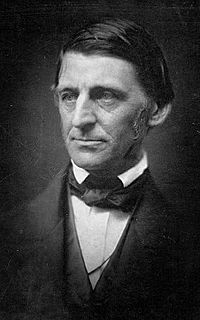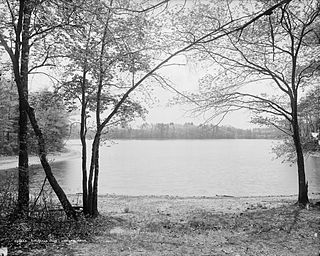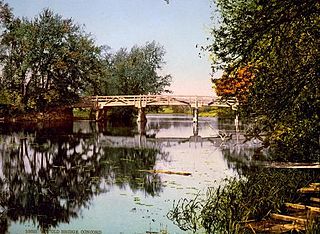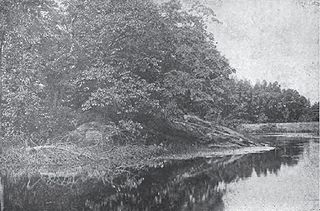
Ralph Waldo Emerson, who went by his middle name Waldo, was an American essayist, lecturer, philosopher, abolitionist and poet who led the transcendentalist movement of the mid-19th century. He was seen as a champion of individualism and a prescient critic of the countervailing pressures of society, and he disseminated his thoughts through dozens of published essays and more than 1,500 public lectures across the United States.

Henry David Thoreau was an American naturalist, essayist, poet, and philosopher. A leading transcendentalist, he is best known for his book Walden, a reflection upon simple living in natural surroundings, and his essay "Civil Disobedience", an argument for disobedience to an unjust state.

Concord is a town in Middlesex County, Massachusetts, in the United States. At the 2010 census, the town population was 17,668. The United States Census Bureau considers Concord part of Greater Boston. The town center is near where the confluence of the Sudbury and Assabet rivers forms the Concord River.

Walden is a book by American transcendentalist writer Henry David Thoreau. The text is a reflection upon simple living in natural surroundings. The work is part personal declaration of independence, social experiment, voyage of spiritual discovery, satire, and—to some degree—a manual for self-reliance.

Samuel Hoar was a United States lawyer and politician. A member of a prominent political family in Massachusetts, he was a leading 19th century lawyer of that state. He was associated with the Federalist Party until its decline after the War of 1812. Over his career, a prominent Massachusetts anti-slavery politician and spokesperson. He became a leading member of the Massachusetts Whig Party, a leading and founding member of the Massachusetts Free Soil Party, and a founding member and chair of the committee that organized the founding convention for the Massachusetts Republican Party in 1854.

Walden Pond is a pond in Concord, Massachusetts, in the United States. A famous example of a kettle hole, it was formed by retreating glaciers 10,000–12,000 years ago. The pond is protected as part of Walden Pond State Reservation, a 335-acre (136 ha) state park and recreation site managed by the Massachusetts Department of Conservation and Recreation. The reservation was designated a National Historic Landmark in 1962 for its association with the writer Henry David Thoreau (1817–1862), whose two years living in a cabin on its shore provided the foundation for his famous 1854 work, Walden; or, Life in the Woods. The National Historic Preservation Act of 1966 ensured federal support for the preservation of the pond.

The Concord River is a 16.3-mile-long (26.2 km) tributary of the Merrimack River in eastern Massachusetts in the United States. The river drains a small rural and suburban region northwest of Boston. One of the most famous small rivers in U.S. history, it was the scene of an important early battle of the American Revolutionary War and was the subject of a famous 19th-century book by Henry David Thoreau.

Mount Wachusett is a mountain in Massachusetts. It straddles towns of Princeton and Westminster, in Worcester County. It is the highest point in Massachusetts east of the Connecticut River. The mountain is named after a Native American term meaning "near the mountain" or "mountain place". The mountain is a popular hiking and skiing destination. An automobile road, open spring to fall, ascends to the summit. Views from the top of Mount Wachusett include Mount Monadnock to the north, Mount Greylock to the west, southern Vermont to the northwest, and Boston to the east. The mountain is traversed by the 92 mi (148 km) Midstate Trail. It is also home to the Wachusett Mountain State Reservation.

The Fitchburg Line is a branch of the MBTA Commuter Rail system which runs from Boston's North Station to Wachusett station in Fitchburg, Massachusetts. The line is along the tracks of the former Fitchburg Railroad, which was built across northern Massachusetts, United States, in the 1840s. It is one of the MBTA's more scenic commuter rail lines, passing by Walden Pond between Lincoln and Concord. Weekend service includes a specially equipped seasonal "ski train" to Wachusett Mountain during the winter.

The Wayside is a historic house in Concord, Massachusetts. The earliest part of the home may date to 1717. Later it successively became the home of the young Louisa May Alcott and her family, who named it Hillside, author Nathaniel Hawthorne and his family, and children's writer Margaret Sidney. It became the first site with literary associations acquired by the National Park Service and is now open to the public as part of Minute Man National Historical Park.

Founded in 1941, the Thoreau Society is the oldest and largest organization dedicated to an American author. It is based in Concord, Massachusetts, United States, at the house where Henry David Thoreau was born in 1817. With members from all 50 states and countries around the world, the Society disseminates knowledge about Thoreau by collecting books, manuscripts, and artifacts relating to Thoreau and his contemporaries, by encouraging the use of its extensive collections, and by publishing two periodicals, the Thoreau Society Bulletin and the Concord Saunterer.

Edwin Way Teale was an American naturalist, photographer and writer. Teale's works serve as primary source material documenting environmental conditions across North America from 1930–1980. He is perhaps best known for his series The American Seasons, four books documenting over 75,000 miles (121,000 km) of automobile travel across North America following the changing seasons.

The Ralph Waldo Emerson House is a house museum located at 18 Cambridge Turnpike, Concord, Massachusetts, and a National Historic Landmark for its associations with American philosopher Ralph Waldo Emerson. He and his family named the home Bush. The museum is open mid-April to mid-October; an admission fee is charged.

The Writings of Henry D. Thoreau is a project that aims to provide, for the first time, accurate texts of the complete works of American author Henry David Thoreau, including his journal, personal letters, and writings for publication. Since the project was founded in 1966, Princeton University Press has published 16 of its volumes. It is based at the Davidson Library at the University of California, Santa Barbara, and directed by Elizabeth Witherell. Funding comes from the National Endowment for the Humanities (NEH), the National Trust for the Humanities, and UC Santa Barbara.

A Week on the Concord and Merrimack Rivers (1849) is a book by American writer Henry David Thoreau (1817–1862). It recounts his experience on a boat trip with his brother on the Concord River and Merrimack River.
Horace Mann Jr. was an American botanist, son of the man considered "father of American Public Education". His mother was one of the famous Peabody Sisters Mary Tyler Peabody Mann. Mentored in botany by Henry David Thoreau, whom he accompanied on an expedition to Minnesota, Mann took classes in zoology with Louis Agassiz and assisted William Tufts Brigham botanize the Hawaiian Islands. Mann was to have headed the botanical garden at Harvard, but died of tuberculosis at age twenty-four. His own herbarium was purchased by Cornell University and became the basis of that university's collection. He is credited with the discovery of more than 100 species.

Egg Rock is an outcrop of Silurian Straw Hollow Diorite at the confluence of the Assabet and Sudbury rivers, where they form the Concord River in Concord, Massachusetts. The outcrop is located on a roughly oval intermittent island of about 100 by 50 meters. Egg Rock is usually accessible using foot trails over land, but during high river levels the island is separated from the mainland by a narrow channel. The highest point of Egg Rock is about 39 meters above mean sea level and about 6 meters above normal river level.

Excursions is an 1863 anthology of several essays by American transcendentalist Henry David Thoreau. The anthology contains an introduction entitled "Biographical Sketch" in which fellow transcendentalist Ralph Waldo Emerson provides a description of Thoreau.

Fairhaven Bay is a lake located within the Sudbury river in Concord, Massachusetts, United States (US). It was frequented by Henry David Thoreau who, together with Edward Hoar, accidentally set fire to the woods near the bay in April 1844, as later described in Thoreau's journal.
A Yankee in Canada, with Anti-Slavery and Reform Papers is an anthology of works by Henry David Thoreau, edited by his sister Sophia Thoreau and his friends William Ellery Channing and Ralph Waldo Emerson. It was published in 1866, after Thoreau’s death, by Ticknor and Fields, the Boston firm that had published Walden.















